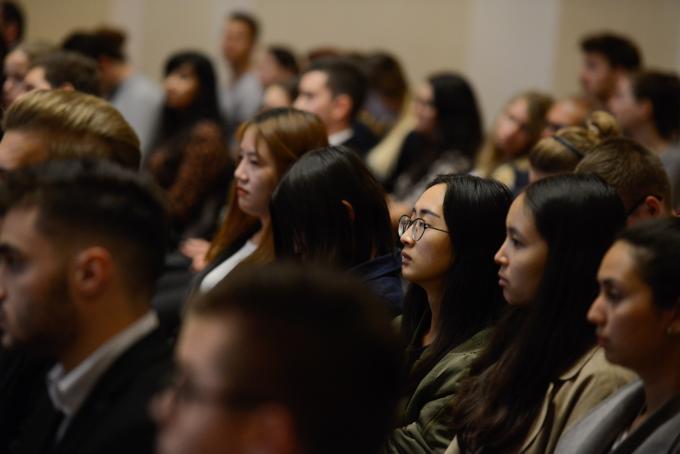
The first guest of the new semester of the Ambassadors’ Forum at Ludovika was H.E. Maria Fe T. Pangilinan Ambassador Extraordinary and Plenipotentiary of the Republic of the Philippines to Hungary who hold her presentation titled “The Philippines Today and Bilateral Relations with Hungary” in the St. Ladislaus Chapel of the Ludovika main building.
H.E. Maria Fe T. Pangilinan has served as ambassador in Budapest since 2015. Her Excellency has studied in Sweden and Belgium in the field of international law and worked at the Office of the United Nations and International Organisations (UNIO) at the Department of Foreign Affairs (DFA), and she was an occasional lecturer at the Foreign Service Institute (FSI) before. Her foreign relations career was started at the consulate in Bonn and then in Bern in the position of deputy and later chief secretary. She served as Chief Consul at the Embassy of the Republic of the Philippines in Prague, Barcelona, and Bucharest, Athens and even London. Her current responsibility extends to Bulgaria, Romania, Moldova, Montenegro, Serbia, and Bosnia and Herzegovina as well.
As a lead up to the presentation, the audience was treated with a colourful presentation on the natural beauty, flora and fauna, as well as cuisine and traditions of the Philippines. The country consists of 7641 islands, and its inhabitants speak 120 languages next to numerous dialects. Her Excellency mentioned that despite of the young populations, they have to face many issues currently.
The country has a very rich history. It was first a Spanish colony, and later came under the influence of the United States. It was occupied by Imperial Japan during the Second World War and it finally gained its independence from Spainon 12 June 1898. Following the war, the whole country, including its capital city Manila, had to be rebuilt. After it gained independence it had to face many internal and external challenges including communist and Muslim insurgencies, bankruptcy, indebtedness, financial crises, voting fraud and corruption. Under the governance of Fidel V. Ramos, the economy flourished, but it was destroyed by the monetary crisis in 1997. Currently, Rodrigo Duterte serves as the President of the Philippines since 2016.
Her Excellency highlighted that her country is one of the founders of the United Nations and also of the ASEAN (Association of Southeast Asian Nations). Its foreign policy rests on the three principles of maintaining national security, furthering economic prosperity and ensuring the right of Filipinos living abroad. As more than 10 million Filipinos live abroad, this is a really important task too.
To achieve these aims, they try to be on good terms with more and more nations. Her two roundtable partners were Dr. János Jelen, rector of the Dharma Gate Buddhist College, and Ferenc Jári, Director of the South and Southeast Asian Department of the Ministry of Foreign Affairs and Trade in Hungary. The event was moderated as usual by NUPS’s foreign policy expert, Dr. János Bóka, Vice-Dean for Science and International Affairs at the Faculty of International and European Studies.
Dr. Bóka highlighted that the purpose of the event is to encourage an open and honest discussion between embassies in Hungary.
“The Philippines is a curious meeting point of east and west, full of charming people and picturesque scenery that cannot be compared to anything else, and Hungary also has many ties of the Philippines”, remarked the Vice-Dean.
According to Ferenc Jári, the cooperation with the Philippines fits right into the colourful foreign policy of Hungary nowadays. The close relations between the Philippines and the united States was also mentioned and according to Her Excellency, “the Unites States is one of the most reliable ally of her nation.” To the question regarding how this relationship changed in the recent past, the Ambassador replied that although they have a bilateral defence treaty with the Unites States, they know that they are not the only nation under the protection of America. Everybody wants to react to out changing world, and living together peacefully in this world has increasingly more importance. According to János Jelen, the colourful religious background of the region rests on mutual respect and understanding, which encourages this. According to Ferenc Jári, time is also needed for good developments to show.